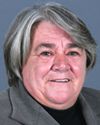Mr. Speaker, when members' statements and question period interrupted us I was talking about the very first letter of this bill.
It is a good bill. I personally think there should be no reason for us not to support it. It will save taxpayers some money. It will make travel better for Canadians travelling to other countries, as well as those travelling to other countries for whom Canada is only a stopping point. I believe the regulations will be adequate to preserve the security of the country. If not, we will chase that down when it comes. We need to be sure that the criminals do not get away with anything because of this.
I was talking about the very first letter of the bill. It is Bill S-22. The first letter is S , which stands for Senate. I said that we should really improve this. This is something that is long overdue. It is too bad that we on this side, every time this happens, have to remind the government that what we have is a failed part of democracy, and that is because the Senate is not elected. There is no excuse for that.
The Prime Minister said during the 1993 election campaign, and I have said it so often that I know it by heart, that “Within two years of being the government we will have an elected Senate”. He promised as Prime Minister, “I can make that happen”.
Instead of castigating him for a broken promise, which I would be slightly tempted to do, I would rather put it on a positive note. Quite clearly, before 1993, our Prime Minister was convinced that it was a good idea or he would not have said it. It is a good idea in his mind. It is certainly a good idea in the minds of Canadians. There is no reason in the world for this not to happen. All he has to do is appoint to the Senate, without any constitutional change, the people who are chosen by the electors.
In Alberta, for example, we had a Senate election. Two people were democratically chosen by the people. They are ready to serve the next time there is an opening for the province of Alberta. All the Prime Minister has to do is say that when the vacancy becomes available “I will appoint the person who the people have chosen”. There is nothing wrong with that. It is a compromise, but at least the people serving in the Senate would be the choice of the people rather than the political choice of the Prime Minister.
If the Prime Minister wants to take this reasoning to the ultimate, if he feels that he can better choose who is to represent Alberta or any other province in the Senate, then why does he not do it for MPs? Why do we have elections for members of parliament? Why do we not just let the Prime Minister appoint whomever he will, in whatever riding. We would have nothing but Liberals in the House. Would that not be wonderful?
Unfortunately Hansard does not indicate sarcasm, so let the record show that the member was dripping with sarcasm when he made that statement. That way it will appear on the record.
I will rest my case there. I would be very pleased to support the bill if it came from an elected Senate with the full legitimacy of what we know and understand to be democracy.


